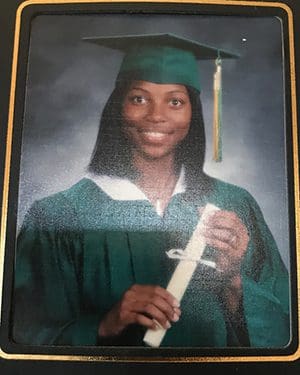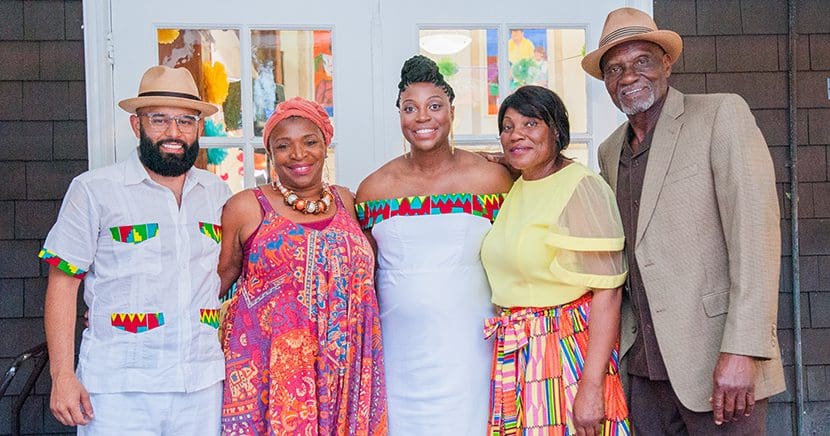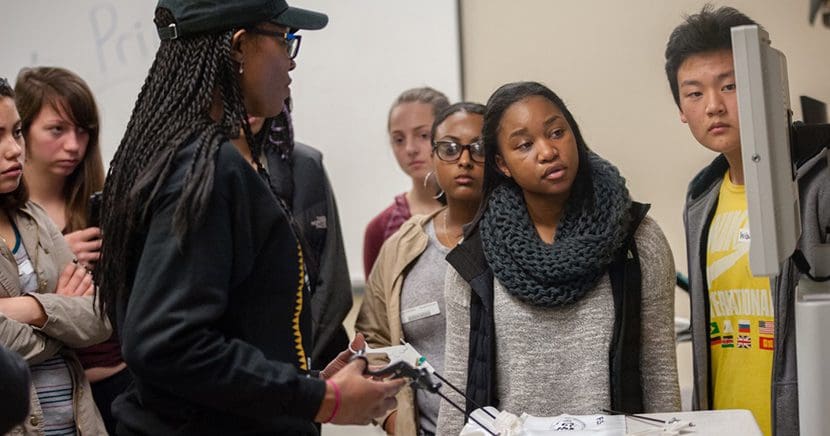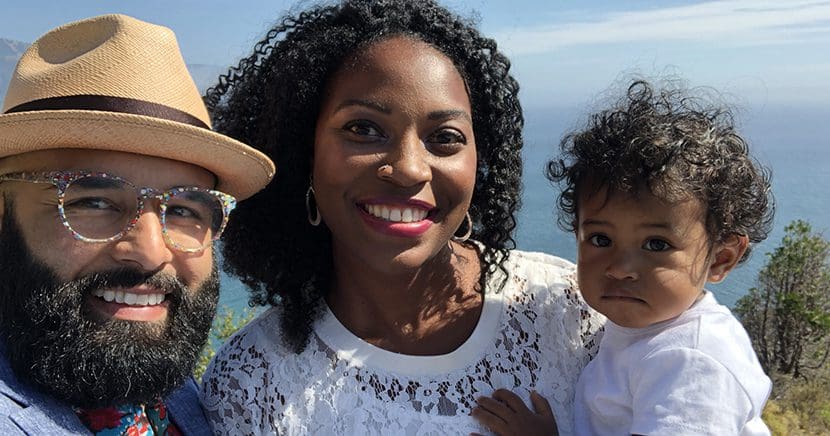Surgeon and assistant professor Estell Williams, MD, has overcome a lot in her 33 years of life. She grew up with limited financial means, survived personal loss and weathered the life-altering effects of Hurricane Katrina. Her road to get to where she is today wasn’t easy, but she wouldn’t have had it any other way.
“My upbringing is nontraditional, but it did truly lay the foundation for me and how I view the world and why I’m passionate about the things I’m passionate about,” she explains.
Overcoming the odds
Born and raised in Oakland, California, Williams grew up amid tumultuous circumstances.
Her father, the son of Louisiana sharecroppers, was discouraged by his teachers from doing well in school and, as a result, graduated high school reading at a third-grade level. (Williams later helped her father improve his reading proficiency by reading the Bible with him every morning before going to middle school.) Her mother became addicted to crack cocaine when Williams was young, eventually leaving the family and forcing Williams’ father to work multiple jobs to keep things together.
With her father hustling to make ends meet, Williams and her older sister were raised in large part by their cousin Gloria, who moved from Michigan to California to help out.
The young family didn’t have much, but Williams always understood the importance of getting an education and how far that foundation could take her.
“My dad knew from his upbringing what it was like when you don’t have those resources of an education,” she says. “That’s why he instilled education as a big component for us. Oakland public schools were not great at the time, so my dad made the decision to put us in private schools. He would pay the tuition before he would pay the mortgage. He didn’t ever want to compromise on education.”

Williams’ high school graduation photo.
Dreaming big
Her dad’s unwavering dedication to education paid off.
At age 5, Williams was tagging along to her cousin’s classes at nursing school, taking such diligent notes that her cousin would sometimes use them to study. In seventh grade, Williams attended science camp and got her first real taste of medicine.
“I dissected a shark eye, and I was in heaven,” she recalls. “I was determined that I was going to be a doctor.”
When she got to high school, Williams earned a spot in a six-week summer residential program through Stanford University. The program, which specifically targets disadvantaged youth who have an interest in medical careers, only reaffirmed her dream.
During that summer, Williams dissected a cadaver with a medical student, shadowed doctors in the hospital, wrote a research paper and met other high schoolers who came from similar backgrounds and had the same goals as her.
It was there that she discovered the university she would eventually attend: Xavier University of Louisiana, a Historically Black College in New Orleans.
“I looked up ‘Black doctors’ online, and one of the first things to come up was Xavier,” Williams says. “It was the number one university at placing African Americans into medical school, and I was like, ‘That sounds right.’”

Williams (center) at her wedding to Edwin Lindo, JD (left), with her biological mother Trena Whitley (second from left), her cousin Gloria Booth, LVN (second from right), and her father Luther Williams (right). Credit: Leah Blanton
Riding out the storm
Buoyed by grants and scholarships for her tuition, Williams enjoyed two years at Xavier in what one might call a dream college experience. Instead of the infamous cutthroat mentality you might expect among pre-med students, Williams and her peers supported each other.
“We all studied together, we all shared notes, we all had the same mentality that we all had to make it to medical school,” she says.
Then in late August 2005, Hurricane Katrina arrived.
Williams and her roommate spent hours in bumper-to-bumper traffic evacuating to Houston the night before the destructive cyclone hit New Orleans. The next morning, Williams turned on the news, saw the devastation and realized that everything she had left behind was gone.
In the aftermath, she recalls going to the Red Cross for clothes and other necessities. It took her dad two weeks to earn enough money to purchase a plane ticket to fly her home to California.
“That time was rough,” Williams says. “I was like, ‘Where do I go from here?’”
She eventually transferred to the University of San Francisco to finish up school, but the experience was perceptibly different. Her interrupted junior year felt like it had been in a fog. And, on top of her classes, Williams also had to work two jobs to help make up for the higher tuition fees.
Picking up the pieces
After graduating, Williams took a postbaccalaureate year to revisit coursework she would need for medical school after Hurricane Katrina disrupted everything. Then she got the news that her nephew, who was only a couple of years older than her, had died in his sleep.
“What they think happened was he had undiagnosed high blood pressure and had a heart attack,” she says. “I knew this wasn’t right. Why wasn’t he diagnosed? Why didn’t he know? We know this happens more in African American communities, so that’s when I started honing in on where I felt like my place in medicine could be.”
She turned her grief into action. Williams applied to medical schools, eventually landing at University of Washington School of Medicine. She also became more involved with educational outreach efforts for underrepresented minorities in medicine.
“I felt like this was something I needed to do with my life because I had benefited so much and would not have made it a fraction of where I was if those programs hadn’t existed,” Williams explains. “I wanted to make for sure that kids like me never felt like they didn’t have support or like they couldn’t achieve something just because they didn’t have money.”
Setting an example
Williams excelled in medical school and the rest, she says, is history.
She stayed on at UW Medicine for her residency. Today she’s a surgeon in the Division of Emergency General Surgery at UW Medical Center – Montlake and an assistant professor of General Surgery at UW School of Medicine.
Her drive to succeed hasn’t just been for herself, though — it’s also for future generations of Black female doctors.
“Just being here as a woman of color, it felt like me carrying a sort of charge to represent myself for every other Black woman who may come after me,” she explains. “Yes, it’s an unfair burden, but that’s life. I take it as an honor and a privilege that I’m able to set a standard for what success looks like and to be a role model for a Black woman who’s looking to go into surgery.”
To its credit, the School has also stepped up its efforts to increase diversity and equity in its medical school and residency programs — some of which Williams has been involved with.
“The leadership we’ve had here has taken an intentional approach to evaluate everyone and try to ensure we can bring in residents that represent diverse backgrounds without losing out on quality,” she says. “It’s us making for sure that we address the uncomfortable conversations, but it allows us to grow for the better.”

Williams demonstrates laparoscopic skills to high school students participating in Doctor for a Day. Credit: Leah Blanton (Photo taken before COVID-19.)
Forging a path for the future
While Williams was blazing through medical school, residency and now her medical career, she didn’t let her outreach efforts waver.
As a School of Medicine faculty member, she makes it a point to connect with medical students and residents to foster a sense of community, including hosting quarterly dinners for residents.
“When you think of people of color, women of color, women in general within academic spaces, the biggest thing that goes toward success is mentorship,” Williams notes. “That’s one place I can see myself having the biggest impact because that’s where I had the biggest impact made on my life. I had some really kickass mentors.”
She’s also involved with several educational outreach programs in the K-12 pipeline, from the same Stanford summer residency that gave her a start as a high school student to Tour for Diversity in Medicine, a mentorship network for underrepresented minorities looking to enter the medical field.
One program that Williams is especially proud to be a part of is UW Medicine’s Doctor for a Day, for which she now serves as the executive director. Conceived by former School of Medicine medical student Joy Thurman-Nguyen, MD, MPH, another woman of color who is Filipino and Black, Doctor for a Day gives students of color the opportunity to learn more about careers in medicine.
Participants practice medical procedures in the UW Medicine WWAMI Institute for Simulation in Healthcare (WISH lab) — intubating a medical mannequin, performing an ultrasound and stitching up a banana after “surgery,” for example — and interact with UW Medicine physicians and faculty.
Even during the COVID-19 pandemic, when in-person visits to WISH lab weren’t possible, Williams made sure to offer educational opportunities for students. One was hosting a Zoom session in collaboration with College Success Foundation, for more than 40 high school students to discuss COVID-19 and how the pandemic has had a disparate impact on minority communities.
“Doctor for a Day invigorates the physicians who work with the kids, because you remember your passion when you first wanted to be a doctor,” Williams says. “It’s also a program that I’m happy to help build because that kid saying she wants to be a doctor? She was once me.”
Estelita’s Library

Williams with Lindo and their daughter, Estella Gloria Wopila Lindo, the namesake for Estelita’s Library.
As if being a surgeon and mentoring future doctors wasn’t enough, Williams and husband Edwin Lindo, JD, a lecturer in the School’s Department of Family Medicine, also started a library in May 2018.
Named after their daughter, Estella, Estelita’s Library in Beacon Hill is part library and part community hub. During non-pandemic times, you’re just as likely to find members chatting about politics in one corner as you are to spot folks reading books or playing chess in another.
“Our mission for this was to be something the community really wanted, which was social justice,” Williams says. “It’s about people of color and oppressed people, so our collection of books centers around the voices of people of color.”
Needless to say, the library has thrived. Williams and Lindo have amplified their efforts to purchase anti-racism literature to help educate the community, and they also have plans to open a second location in the Central District.


